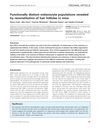 February 2024 in “Biomedicines”
February 2024 in “Biomedicines” Hormones like androgens, estrogen, thyroid hormones, and stress hormones can contribute to hair loss, and treatments target these hormonal imbalances.
 February 2024 in “BMC genomics”
February 2024 in “BMC genomics” The TRPV3 gene variant may cause the long-haired suri alpaca coat.
 February 2024 in “Brain research bulletin”
February 2024 in “Brain research bulletin” Blocking androgen activity in newborn rats affects body weight and appetite-related hormones differently in males and females.
[object Object] 
Different stem cells are key for hair growth and health, and understanding their regulation could help treat hair loss.
 August 2023 in “International Journal of Molecular Sciences”
August 2023 in “International Journal of Molecular Sciences” The human scalp hair bulb contains different types of melanocytes with varying abilities to produce melanin.

Different genes cause Female Pattern Hair Loss compared to male hair loss, and treatments vary, but more research is needed to understand it fully.
 May 2023 in “Frontiers in Immunology”
May 2023 in “Frontiers in Immunology” Treg cell-based therapies might help treat hair loss from alopecia areata, but more research is needed to confirm safety and effectiveness.
 January 2023 in “Türkiye klinikleri adli tıp ve adli bilimler dergisi”
January 2023 in “Türkiye klinikleri adli tıp ve adli bilimler dergisi” DNA markers can help predict male pattern baldness, useful in criminal and missing person cases.
 October 2022 in “Frontiers in Endocrinology”
October 2022 in “Frontiers in Endocrinology” New tools show that in fish, NPY increases feeding and somatostatin decreases it.
 10 citations,
November 2010 in “Pigment Cell & Melanoma Research”
10 citations,
November 2010 in “Pigment Cell & Melanoma Research” Only skin melanocytes, not other types, can color hair in mice.

Skin stem cells are crucial for maintaining and repairing skin, with potential for treating skin disorders and improving wound healing.
 October 2011 in “Dermato-endocrinology”
October 2011 in “Dermato-endocrinology” Hormones significantly affect skin health, with vitamin D playing a key role.
37 citations,
November 2017 in “Medical Sciences” Melanoma's complexity requires personalized treatments due to key genetic mutations and tumor-initiating cells.
[object Object]  31 citations,
April 2007 in “Experimental Dermatology”
31 citations,
April 2007 in “Experimental Dermatology” Stress in mice delays hair growth and treatments blocking substance P can partly reverse this effect.
 23 citations,
January 2020 in “Central-European Journal of Immunology/Central European Journal of Immunology”
23 citations,
January 2020 in “Central-European Journal of Immunology/Central European Journal of Immunology” Alopecia areata, a type of hair loss, is likely an autoimmune disease with a genetic link, but its exact cause is still unknown.
 5 citations,
November 1992 in “Current problems in dermatology”
5 citations,
November 1992 in “Current problems in dermatology” Glucocorticoids are powerful anti-inflammatory drugs that must be used carefully to avoid serious side effects.















